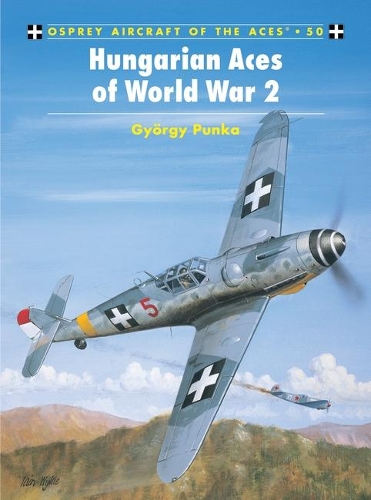
Hungarian Aces of World War 2
(Paperback)
Publishing Details
Hungarian Aces of World War 2
By (Author) Gyrgy Punka
Illustrated by Stephan Boshniakov
Illustrated by Iain Wyllie
Illustrated by John Weal
Illustrated by Mark Styling
Bloomsbury Publishing PLC
Osprey Publishing
18th October 2002
United Kingdom
Classifications
General
Non Fiction
European history
Second World War
Modern warfare
940.5449439
Physical Properties
Paperback
96
Width 184mm, Height 248mm, Spine 7mm
328g
Description
Like Germany, Hungary was forbidden from having an air force following the defeat of the Austro-Hungarian Empire at the end of World War 1. However, again like Germany, the new state of Hungary created an air arm in secret during the 1930s. Hungarian fighter pilots first saw action against their Slovakian neighbours in early 1939, following the annexation of Czechoslovakia by Germany. In June 1941, Hungarian armed forces joined the Germany in the invasion of Russia, and pilots from the I/I Fighter Group saw continuous action into 1942. Flying CR.42s, Re.2000s and Bf 109Es, pilots scored a modest number of kills. However, when the Bf 109G-equipped Hungarian 101 Puma1 Fighter Regiment was committed to action over Kharkov in April 1943, numerous aces started to rapidly build their scores. One year later the unit returned home in order to defend Hungarian cities from American heavy bombers, and pilots such as Dezs Szentgyrgyi and Gyrgy Debrdy scored the bulk of their kills in desperate battles against American fighters and bombers. Unlike most of Germanys Eastern European allies, Hungary did not capitulate during the Russian advances of 1944, and its fighter pilots fought on until May 1945.
Author Bio
Gyrgy Punka is an aviation engineer based in Budapest. He has written several books and numerous articles on the Hungarian Air Force during World War 2. This is his first volume for Osprey. Stephan Boshniakov is an aviation researcher based in Sofia. He has done work in the past for the Bulgarian Aviation Museum. This is his first volume for Osprey.
